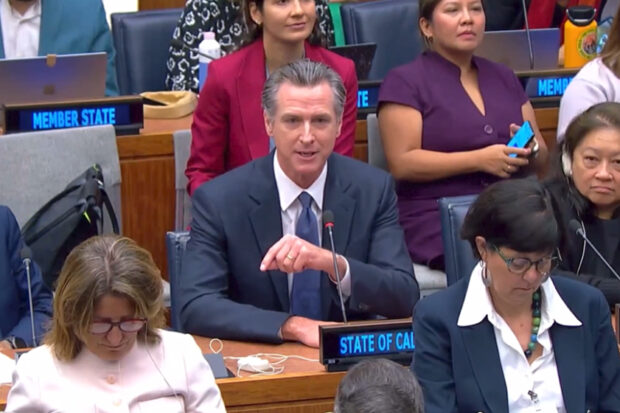
I don’t envy Gov. Gavin Newsom. He has a young daughter counting on him to address climate change and safeguard her future. The burden of such a responsibility, so close to the heart, must weigh as heavily as that of the other 40 million Californians also relying on his judgment.
“Her lack of optimism,” Newsom recently told a New York audience, “that’s incalculable. And perhaps there’s the greatest shame of all: her anxiety that she has and her friends have. A 13-year-old, who should be filled with idealism and optimism, is filled with dread and stress because she’s seen her dad come back from too many wildfires, too many droughts and floods.”
I can relate. My son was eight when I first read of the increasing risks our rapidly warming planet posed within his lifetime. For 24 years, I’ve carried a gnawing doubt in my gut that I believe the governor now feels, too.
Newsom’s comments came in mid-September. He was back on stage at Climate Week NYC, this time with a parent’s worries, a mea culpa and a furious assault on oil executives. The mea culpa was short and emphatic, a prelude to the attack.
“Now I know. I get it now. I get it. I get why three years ago when I stood on this stage quite literally a few inches from where I am sitting, I get why I was so naive,” Newsom insisted. “Because I didn’t know the depths of their deception…The issue is fossil fuels, and the issue is the deceit from these companies.”
Apparently what finally opened our 55-year-old governor’s eyes, first elected to the San Francisco County Board of Supervisors in 1997, is information found in the lawsuit he and State Attorney General Rob Bonta filed in September against California’s five largest fossil fuel companies—Exxon, Shell, Chevron, ConocoPhillips and BP—and the American Petroleum Institute. Their crime? A half century of intentionally deceiving the public—and gullible politicians—about the impacts of burning fossil fuels.
I recognize Newsom’s progression. I was 40 in 1999 when Pulitzer Prize winner Ross Gelbspan did me the same favor with his book, published two years earlier when Newsom first took office, The Heat Is On: The Climate Crisis, the Cover-up, the Prescription. Gelbspan meticulously lays out the Big Tobacco–style defense the people leading fossil fuel companies had unleashed. To this day, they continue to derail meaningful action and foster political corruption, from city councils to the U.S. Supreme Court.
Legal brief or journalistic exposé, the printed proof can pull back a layer of one’s internal mental onion that in retrospect looks a lot like cognitive dissonance, even willful ignorance. And it’s only one layer. The next is labeled “The Economy.” It’s a thick one, people having been conditioned for decades to insist on “win-win” solutions offering both private profit and environmental protection.
Like the state’s last three governors in a row, Newsom embraces an ideology of techno-fixes financed through pollution credit trading and government subsidies. “There’s simply no better place to invest in a low carbon, green future than the state of California,” he exhorted his audience.
However, people living in the state’s two smoggiest air basins, the San Joaquin Valley and the South Coast, can attest to the failures of “cap-and-trade” strategies to clear our skies of ozone and fine particle pollution. Phantom credits, false inventories, shoddy accounting, weak enforcement and exemptions for agriculture, shipping and developers have blocked success for 30 years. It’s a rulemaking system delayed by politics and lawsuits, hamstrung by captive agencies and deferential courts.
At the global scale, comparable carbon-credit trading systems have emerged and with similar problems. Many function like shady cryptocurrencies built on independent trading platforms with no reliable oversight. Fraudulent credits have been widely issued, and not only does the system create a perverse incentive to increase the supply of credits, like crypto it actually increases energy consumption and environmental harm.
Nonetheless, back in New York Newsom was Bitcoining the state’s greenhouse gas reduction plans with a Silicon Valley, venture capitalist, IPO, tech-bro sales pitch. He wants to rapidly scale up state programs through deregulation and massive investments of public and private cash. Not so coincidentally, a large new pool of credits is about to be created through passage of SB 253, the Climate Corporate Data Accountability Act.
The California Air Resources Board, which oversees the state’s cap-and-trade program for carbon credits, will establish a new system for the state’s 5,300 largest companies to begin reporting their carbon emissions in 2025, according to watchful website CarbonCredits.com. An accurate emissions inventory of California’s largest companies is surely needed but not as a basis for continued reliance on carbon credit trading.
San Joaquin Valley residents will pay with their health and life spans as the 25,000-square-mile air basin continues to be converted into a carbon-credit enterprise zone for Big Oil and other major polluters. More companies looking to “offset” their greenhouse gas emissions—rather than being required to reduce them—will soon come shopping. Biomass plants, dairy digesters, methane-hydrogen, diesel, carbon capture and more are being labeled “renewable” and “green,” their newly created credits auctioned off along with local air and water quality, particularly in rural communities and urban industrial zones.
This market-based response to climate collapse ignores the core problem: a needle-nosed, pyramid-shaped economy that needs its top lopped off, the wealth of its elites and executives used to close “the gates of hell” that UN Secretary-General António Guterres told Climate Week attendees humanity has opened. Guterres has repeatedly warned world leaders that the current economic system needs to be radically restructured.
Few politicians—even worried fathers—are willing to peel back that layer.
